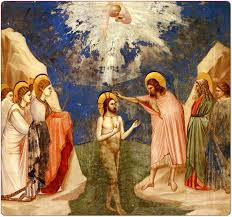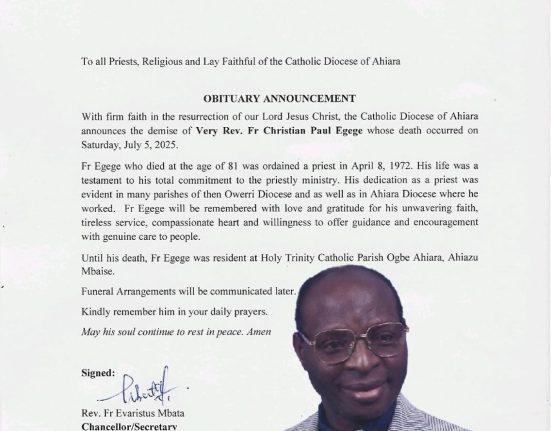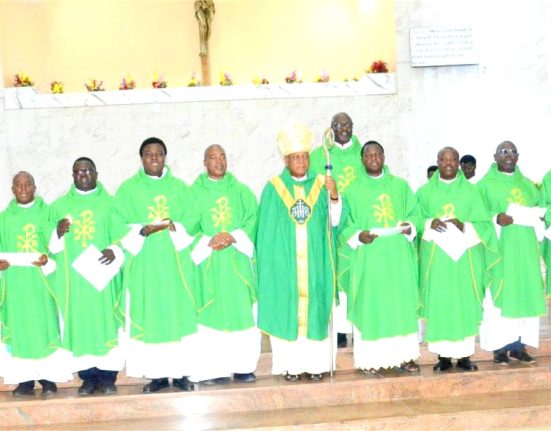BAPTISM OF OUR LORD
“As soon as Jesus was baptized, he came up from the water, and suddenly the heavens opened and he saw the Spirit of God descending like a dove and coming down on him. And a voice spoke from heaven: This is my Son the beloved; my favor rests on him”.

In the name of the Father and of the Son and of the Holy Spirit: Amen. Good morning my brothers and sisters in Christ! Today, as most you have known already is the feast of the Baptism of Our Lord.
From the very beginning, all authorities have agreed that the baptism of John was a baptism of repentance and God’s forgiveness. As a baptism of repentance, it was meant for people who had been sinners, but were now willing to renounce their sins and return to God. As the Son of God and God himself, Jesus could never have had any sins that he would have had to renounce or repent of. The Bible tells us in the letter to the Hebrews that Jesus was like us in all things but sin (Hebrew 4:15) and the Apostle Peter adds that “he had done nothing wrong and had spoken no deceit” (1 Peter 2:22). If Jesus did not sin then, Jesus did not need baptism of any sort from anyone. John the Baptist himself was the first to acknowledge this fact. He was totally surprised that Jesus would come to him for his baptism since he had no need of it. If therefore, Jesus submitted himself to the baptism of John, that he did not need, there must have been a reason or reasons behind it.
Again, many authorities have given various and varying interpretations to the events that happened at the baptism of Jesus. For instance, one early Christian writer, by name St. Proclus of Constantinople, had this to say: “The baptism of Jesus was not a case of him being sanctified by the water he was baptized in. It was rather a case of him sanctifying that water and with all other waters in the whole world, thereby giving them the power to sanctify us.”What this means is that before Christ came, no water anywhere had any power to sanctify or make anyone holy. That is why John the Baptist’s baptism was only a baptism of repentance, and not the one of sanctification or rebirth or regeneration, like our own Christian baptism instituted by Christ. But when Jesus went into the water of the River Jordan to be baptized by John, God, you might say, washed himself into that water. “At that very moment, that water became sanctified water, holy water, even one could say “divinized water.”
As everyone knows in our elementary geography we are told that, the waters of a river, any river, end up in a sea somewhere. The one of the seas merge into the waters of the oceans of our world at large. If that is the case, it is logical to say that water of the River Jordan that Jesus was washed in over 2000 years ago must have all these years mingled with all other waters of our world. Consequently, the sanctification of the River Jordan at the Baptism of Jesus must somehow have spread into all other waters everywhere. As a result of this, all those waters have been empowered to bring sanctification to all who are washed in them in the name of the Trinity: (God the Father, God the Son and God the Holy Spirit). This is what happens at Christian baptism with the invocation of the name of the blessed Trinity. The salvific and sanctifying power that was bestowed on water over 2000 years ago by the Baptism of Jesus in the Jordan, is released to cleanse and sanctify us; something that could not happen before Jesus had himself washed in the Jordan and before he instituted the sacrament of Baptism.That is my own reading and understanding of the interpretation of the Baptism of our Lord by St. Proclus of Constantinople. But permit me to add some more reflections of my own. When Jesus came to the Jordan to be baptized by John, inevitably, he mingled with sinners there, sinners who had come to renounce their sins publicly by being baptized. By submitting himself to that rite of repentance, Jesus made himself one with the sinners. You might say that he identified with the sinners. Of course, that did not make him a sinner like them. But it certainly gave everyone the impression that he was one of them. That very same attitude would follow Jesus throughout his public ministry.A very common adage says: “Show me your friends, and I will tell you who you are.” Jesus apparently, did not believe in that adage, because his friends were the riff-raff of his time: notorious criminals, prostitutes, extortionist, a bunch of political terrorists, who went by the respectable name of “Zealots All these support the assertion that Jesus kept the company of sinners, beginning from his being baptized with them. He was sympathetic, even empathetic towards them. He said: “…I did not come to call the virtuous, but sinners” (Matthew 9:13).
We should note that he did not say that he came to confirm them in their sinfulness. Rather he said he came to call them, obviously, out of their sinfulness: to give up their sins. But he did not stay on some holy mountain and shout to them to come up to him from the valley of their sinfulness. Rather, he went down into the valley to bring them up with himself to the mountain of holiness.
The other reason why Jesus accepted the Baptism of John though he had not sin, was because God had chosen this way to make him known to John and the people. The Gospel reading of today tells us that after his baptism, the voice announced him “this is my son, the beloved and my favor rest on him”. If he had not gone through that baptism the Holy Spirit would have not introduced him to John and the People. What lesson can we the Christians of today learn from the Baptism of our Lord? Truly there are many lessons we can learn from the Baptism of our Lord. First, if that was the attitude and style of Jesus towards sinners, it must be the attitude and style of his Church, indeed every Christian, every follower of Christ enough therefore, of our “holier-than-thou” attitude, enough of our condemnation of sinners – real or imagined. That is the attitude Jesus condemned in the Pharisees. That is why such an attitude is called a “Pharisaic attitude.”
Like our Lord and Master, let us learn to be sympathetic towards sinners and toil relentlessly for their conversion. We should also pray unceasingly for their conversion, instead of praying that they should roast in hell. As our Lord has done and given us the example, we are to go and do likewise.Just as our Lord received baptism everybody male or female must be baptised in order to share in the son ship or daughter ship of the children of God. That is why baptism is seen as a spiritual birth, without it, we are excluding ourselves from the children of God. It is only when we are baptized that God will say what he said about Jesus “This is my son, my daughter the beloved and my favor rest on you. If we are children of God, if baptism has made us children of God, then there are certain consequences. We cannot just say that we are children of God, and leave it at that. There are certain things that are expected of us as children of God. Our way of life, the things that we say and do must show that we are truly children of God. That is to say, our way of life, our behavior must match our status and dignity as children of God. You cannot say that you are a child of God, and live and behave in ways that are unbecoming of a child of God.
If someone is the son or daughter of a king, a prince or princess, there are certain things that you expect from him or her, and certain things that you do not expect from them. It is the same thing with those of us that are the children of God. There are certain things that God and people expect from us, and certain other things that they do not expect from us. We know those things. We have them in the Bible and in the teaching of the Church. They are the things that we promised at our Baptism: namely, that we rejected Satan, and all his works, and all his empty promises; that we believed in God, the Father Almighty, in Jesus Christ his Son our Lord, in the Holy Spirit, the Holy Catholic Church, and so on. Now we must put all those things into practice if we are truly sons and daughters of God. If we do not put them into practice, then God is not our Father, and we are not his children.If a father has a child who is doing things that uplift the family name, he will be very pleased with that child. But if a father has a child who is doing things that disgrace the family name, maybe he or she is an armed robber, a drug trafficker, a hired assassin, or a prostitute, the father will be too ashamed to even call that child his own. The father may even disown that child.It is the same thing with God. As long as we are doing things that are pleasing to him, things that are good and noble, he will acknowledge us as his children. But if we insist on doing things that are displeasing to him, he will disown us; he will not call us his children.
My dear friends, the Baptism of Jesus that we celebrate today is a reminder of our own baptism. It should also remind us of our exalted status and dignity as children of God. We must now do everything in our power to live up to that status and that dignity, so that we can be really and truly be sons and daughters of God, that Baptism has made us. May the Lord bless his word in our hearts: Amen!
+Ab Matthew AUDU
– Jos –










Leave feedback about this